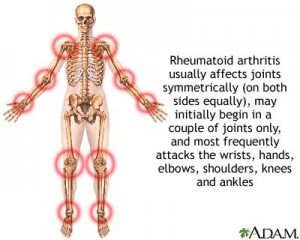Any medication that is very effective in one area may also have side effects.
An analysis of randomized trial has confirmed, that rheumatoid arthritis patients who are treated with anti- tumor necrosis (TNF) antibodies, are at an increased risk for cancer. A study from the Mayo Clinic and other studies from institutions in the U.K. showed that patients who are treated with the monoclonal antibodies infliximab (Remicade) and adalimumab (Humira) are at a higher risk for serious infections.
This may sound like a blow to any patient with rheumatoid arthritis. Treatment with Monoclonal antibodies and anti-Tumor necrosis antibodies has revolutionized the care of these patients. The medications are highly effective and have made a difference for many affected with rheumatoid arthritis.
Dr. Eric Matteson, a study co-author and professor of medicine in the division of rheumatology at the Mayo Clinic points out, that the concerns about infection and malignancy are not new. They are already mentioned in the drug labeling. The risk for cancer was statistically significant only in the high-dose groups. It was also impossible to draw any conclusions about whether any type of malignancy occurred more often than another. He also emphasized, that doctors and patients have to be alert to signs of infection, and age-appropriate cancer screening is of great importance for the patient who takes these particular medications.
Dr. John Esdaile from the University of British Columbia mentions some additional points. These medications are not handed out freely to any patient with R.A. The treatment cost of about $18,000 per year does not make this a standard medication for anybody with R.A. Patients with severe disease who have failed to get relief from any conventional medications would be the ones who are considered for this treatment. Most patients would likely be receiving doses in the lower range of the spectrum, and patients usually know within 3 months, whether the medication is helping them. The medications do not work in everyone, but for 50% of the patients the effect is dramatically positive. The patient, whose joints were being destroyed by rheumatoid arthritis, can go from a state of terrible pain and disability to being able to return to a good quality of life.
The key is close screening of patients regarding the suitability of the therapy. The possible increased risk for malignancies and infection must be discussed with candidates for anti-TNF therapy. Finally close monitoring for infection and cancer screening is necessary.
More information about rheumatoid arthritis: http://nethealthbook.com/arthritis/rheumatoid-arthritis/
Reference: The Medical Post, June 2, 2006, page 1 and 7.
Last edited Nov. 1, 2014






